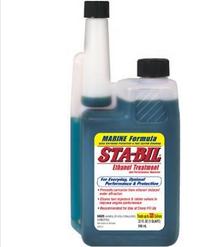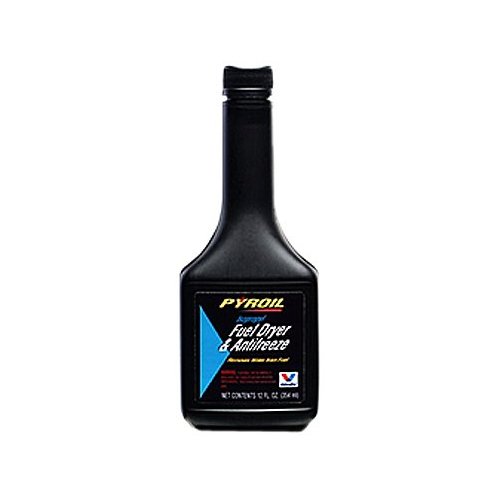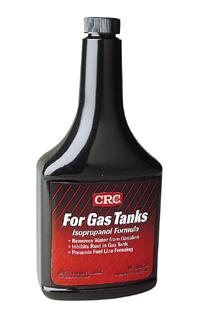if theres a good deal of water you have little choice but to drain the fuel tank and flush the fuel lines out, but if its just stale fuel or it contains a bit of moisture, you might try adding gas drier, (basically an alcohol /lubricant mix that allows the gas and water to blend and burn as it passes thru the injectors)
It took me awhile but I learned you need to put a couple cap fulls of the dark blur MARINE STA-BIL in the mowers gas tank before you store it, or in several weeks time the alcohol makes the mower hard or impossible to start.

http://www.valvoline.com/products/brand ... ifreeze/24


while the older injectors do tend to function with e85 fuel they are usually not truely compatible with ethanol and the o-rings may swell or slowly fail on the earlier c4 corvettes, it was not until the LS series engines were put into cars that true E85 compatible injectors and fuel line components were factory installed (1997) at the earliest.
most times what most people refer to as bad gas is just fuel with water content or micro rust and water or simply very old gas thats started to beak down, obviously adding fresh fuel dilutes the problem so the more you can add the faster the percentage of bad fuel is reduced, the main problem is the corrosion moisture causes and the micro trash that the filter might not stop reaching the injectors, but in most cases changing the fuel filter and adding both gas drier and fuel injector cleaner helps, and constantly adding fresh fuel and changing out the fuel filter once or twice shortly eliminates the problem
Why does gasoline go stale so quickly?
August 25, 2006
Dear Cecil:
Popular opinion holds that gasoline is unstable and lasts six months at the most; some claim it loses its "edge" after as little as two weeks. Practical experience seems to show that gasoline can be stored without special precautions for years with no noticeable deterioration. Storage conditions are supposed to make a huge difference, but in my observation they don't. What's the straight dope on this?
— Sean Costall, via e-mail
I know what you're thinking. This stuff was stored in the ground, admittedly in unrefined form, for millions of years without losing its potency, but once topside it's got the shelf life of a tomato? Doubtless the risk of gas going stale is often exaggerated. Still, no getting around one basic truth: in principle gas can go bad.
The shelf life of gasoline depends on the type of gas and the storage conditions and can range from a couple months to a couple years. One wild card is that gas you buy at the pump may already have been in storage for anywhere from days to months.
What makes gas go stale? Usually the first thing that happens is the lighter chemicals in it evaporate, leaving behind a heavier, less peppy product. Gasoline is an ideal motor vehicle fuel partly because it vaporizes readily to form a combustible mix with air. If it sits unused, however, its more volatile components waft away, leading to poorer engine performance. It's hard to tell how much punch your gas has lost without scientific testing, but don't worry — though your car might start a little harder, it'll still run (assuming it ran before), and there's little risk in burning the fuel if this is all that's gone wrong.
The second cause of bad gas is oxidation — some of the hydrocarbons in the fuel react with oxygen to produce new compounds, almost all of them worse than what you started with. When oxidation becomes a problem, you'll know it without lab tests — the gasoline gives off a sour odor. If you pour some into a glass container, you'll see it's turned dark, and you might find small, solid particles of gum. Using oxidized gasoline is a bad idea, since the gum can clog your fuel filter, create deposits in your fuel system (especially the injectors), and generally hurt performance.
Finally there's the problem of contamination. Water, which can cause gas-line freezing and other problems, is the main culprit — it usually gets into stored gas via condensation as temperatures fluctuate. If the gas is relatively fresh, a "fuel dryer" additive (basically isopropyl alcohol) can help by combining with the water to make a burnable mix that can be run through the system. Another potential problem caused by water is bacteria, although that's not nearly as common. Gas contaminated with dirt or rust is a no go, as the crud will foul your engine.
The push for reformulated gasoline using ethanol (such as E10, aka gasohol) has heightened concerns about gasoline stability. On its Web site Chevron claims "federal and California reformulated gasolines will survive storage as well or better than conventional gasoline," and I can't find any good test data to dispute that. The fact remains that ethanol is hydrophilic, meaning it tends to draw moisture out of the air, so theoretically gasohol should become contaminated more easily than pure gasoline.
The shelf life of gasohol is difficult to determine — proponents claim it's similar to that of pure gasoline but present no hard data. Anecdotally speaking, boat owners and survivalists — people who often deal with stored gasoline — report a much shorter shelf life for gasoline-ethanol blends and advise against storing them long-term.
How to keep your fuel April fresh? First, store it only in clean containers with tight caps. Whether the containers are metal or plastic doesn't matter much, although steel can eventually rust. Fiberglass containers should be avoided unless they're rated safe for alcohol-containing fuels. Keep the container nearly full to reduce exposure to air, but not completely full, so the gasoline can expand or contract as the temperature changes. That said, try to minimize those temperature swings — store gasoline in a cool place to reduce evaporation and oxidation. Consider a gas stabilizer for fuel you plan to keep awhile, but remember stabilizers are meant to prevent gasoline from going bad; they won't restore bad gas to its former health.
There's no easy way to get rid of bad gasoline, but don't be a pig and dump it down the drain. If you really can't use it, contact your city or county to ask where you can dispose of it legally. Some people recommend using it in a lawn mower, but you risk gumming up the mower's works instead. What's left, tiki torches? Better to time your gas consumption and purchases so you don't need to store any — gas prices being what they are, no sense tying up cash in something that may just go to waste.
— Cecil Adams
It took me awhile but I learned you need to put a couple cap fulls of the dark blur MARINE STA-BIL in the mowers gas tank before you store it, or in several weeks time the alcohol makes the mower hard or impossible to start.

http://www.valvoline.com/products/brand ... ifreeze/24

while the older injectors do tend to function with e85 fuel they are usually not truely compatible with ethanol and the o-rings may swell or slowly fail on the earlier c4 corvettes, it was not until the LS series engines were put into cars that true E85 compatible injectors and fuel line components were factory installed (1997) at the earliest.
most times what most people refer to as bad gas is just fuel with water content or micro rust and water or simply very old gas thats started to beak down, obviously adding fresh fuel dilutes the problem so the more you can add the faster the percentage of bad fuel is reduced, the main problem is the corrosion moisture causes and the micro trash that the filter might not stop reaching the injectors, but in most cases changing the fuel filter and adding both gas drier and fuel injector cleaner helps, and constantly adding fresh fuel and changing out the fuel filter once or twice shortly eliminates the problem
Why does gasoline go stale so quickly?
August 25, 2006
Dear Cecil:
Popular opinion holds that gasoline is unstable and lasts six months at the most; some claim it loses its "edge" after as little as two weeks. Practical experience seems to show that gasoline can be stored without special precautions for years with no noticeable deterioration. Storage conditions are supposed to make a huge difference, but in my observation they don't. What's the straight dope on this?
— Sean Costall, via e-mail
I know what you're thinking. This stuff was stored in the ground, admittedly in unrefined form, for millions of years without losing its potency, but once topside it's got the shelf life of a tomato? Doubtless the risk of gas going stale is often exaggerated. Still, no getting around one basic truth: in principle gas can go bad.
The shelf life of gasoline depends on the type of gas and the storage conditions and can range from a couple months to a couple years. One wild card is that gas you buy at the pump may already have been in storage for anywhere from days to months.
What makes gas go stale? Usually the first thing that happens is the lighter chemicals in it evaporate, leaving behind a heavier, less peppy product. Gasoline is an ideal motor vehicle fuel partly because it vaporizes readily to form a combustible mix with air. If it sits unused, however, its more volatile components waft away, leading to poorer engine performance. It's hard to tell how much punch your gas has lost without scientific testing, but don't worry — though your car might start a little harder, it'll still run (assuming it ran before), and there's little risk in burning the fuel if this is all that's gone wrong.
The second cause of bad gas is oxidation — some of the hydrocarbons in the fuel react with oxygen to produce new compounds, almost all of them worse than what you started with. When oxidation becomes a problem, you'll know it without lab tests — the gasoline gives off a sour odor. If you pour some into a glass container, you'll see it's turned dark, and you might find small, solid particles of gum. Using oxidized gasoline is a bad idea, since the gum can clog your fuel filter, create deposits in your fuel system (especially the injectors), and generally hurt performance.
Finally there's the problem of contamination. Water, which can cause gas-line freezing and other problems, is the main culprit — it usually gets into stored gas via condensation as temperatures fluctuate. If the gas is relatively fresh, a "fuel dryer" additive (basically isopropyl alcohol) can help by combining with the water to make a burnable mix that can be run through the system. Another potential problem caused by water is bacteria, although that's not nearly as common. Gas contaminated with dirt or rust is a no go, as the crud will foul your engine.
The push for reformulated gasoline using ethanol (such as E10, aka gasohol) has heightened concerns about gasoline stability. On its Web site Chevron claims "federal and California reformulated gasolines will survive storage as well or better than conventional gasoline," and I can't find any good test data to dispute that. The fact remains that ethanol is hydrophilic, meaning it tends to draw moisture out of the air, so theoretically gasohol should become contaminated more easily than pure gasoline.
The shelf life of gasohol is difficult to determine — proponents claim it's similar to that of pure gasoline but present no hard data. Anecdotally speaking, boat owners and survivalists — people who often deal with stored gasoline — report a much shorter shelf life for gasoline-ethanol blends and advise against storing them long-term.
How to keep your fuel April fresh? First, store it only in clean containers with tight caps. Whether the containers are metal or plastic doesn't matter much, although steel can eventually rust. Fiberglass containers should be avoided unless they're rated safe for alcohol-containing fuels. Keep the container nearly full to reduce exposure to air, but not completely full, so the gasoline can expand or contract as the temperature changes. That said, try to minimize those temperature swings — store gasoline in a cool place to reduce evaporation and oxidation. Consider a gas stabilizer for fuel you plan to keep awhile, but remember stabilizers are meant to prevent gasoline from going bad; they won't restore bad gas to its former health.
There's no easy way to get rid of bad gasoline, but don't be a pig and dump it down the drain. If you really can't use it, contact your city or county to ask where you can dispose of it legally. Some people recommend using it in a lawn mower, but you risk gumming up the mower's works instead. What's left, tiki torches? Better to time your gas consumption and purchases so you don't need to store any — gas prices being what they are, no sense tying up cash in something that may just go to waste.
— Cecil Adams
